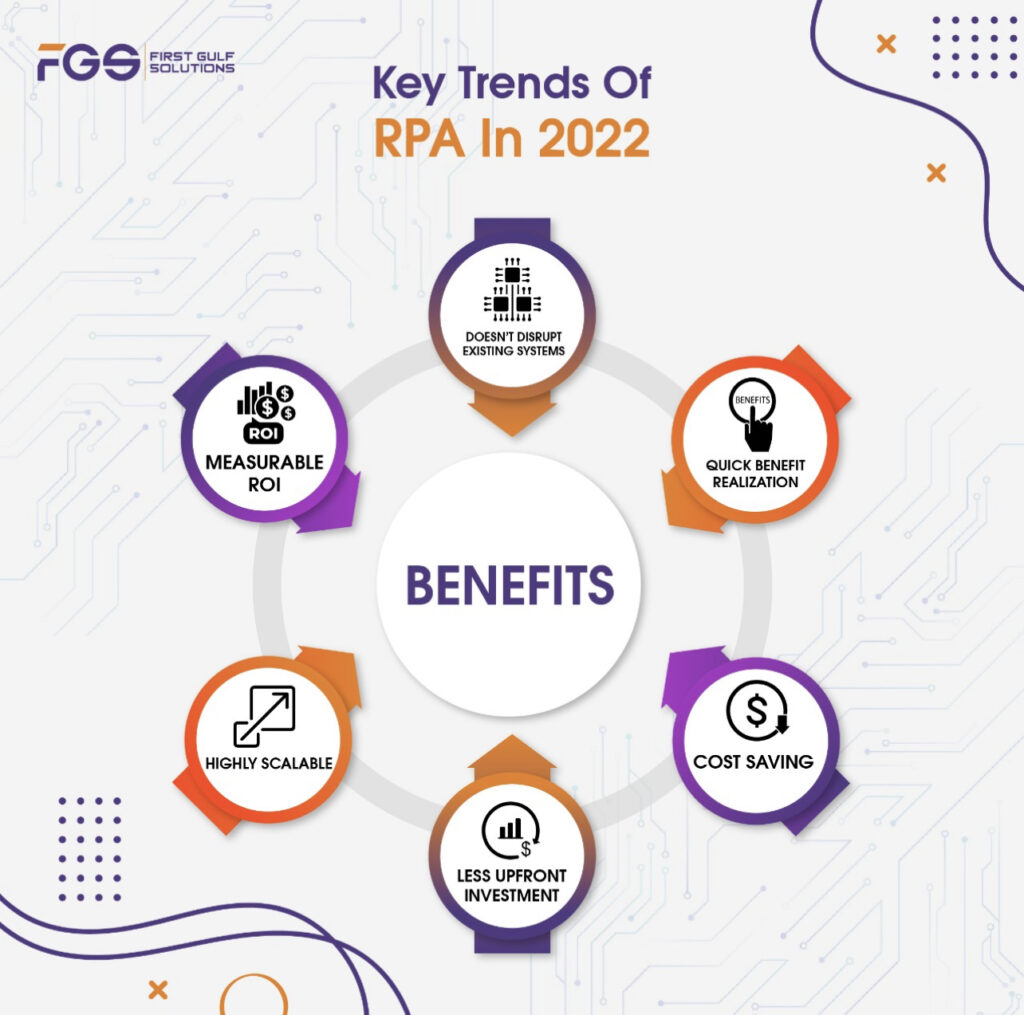Process automation Key trend 2022
Process automation plays a critical role in today’s digital transformation technology stack. The rapid adoption and implementation of RPA (robotic process automation) is evident. According to Gartner, the RPA market will grow at double digit rates through 2024 despite economic pressures from the pandemic. This bodes well for RPA consultants.
Some of the key factors that drive adoption of RPA solutions is its ability to improve process quality, speed, and productivity. Further, COVID-19 and its aftermath have increased the interest in RPA across many verticals. In fact, future RPA clients may come from non-IT buyers as predicted by many analysts. If you are an organization interested in process automation and what RPA trends will dominate in 2022, here are some key RPA Trends to watch out for.
1. Automated intelligence
Intelligent Automation (IA) combines RPA and artificial intelligence to accelerate digital initiatives by empowering end-to-end processes. Enterprises that supplement RPA with AI broaden the scope of business process automation to almost any scenario. Cognitive bots constantly learn from data and make decisions, eventually becoming valuable members of your hybrid workforce. Consider Arteris, a Highway Management firm based in Brazil that built a shared services centre based on intelligent automation and analytics. This enabled the company to achieve greater economies of scale, including a 50 percent reduction in workforce and faster month-end closing.
2. RPA Center of Excellence
The RPA Centre of Excellence is the central group in charge of implementing RPA in an organisation. The RPA CoE could include IT experts, RPA consultants, process managers, and functional experts from various teams. This CoE’s role is to establish a governance model, best practises, and expertise in order to maximise the return on investment. Creating an RPA CoE has numerous advantages, including increasing the efficiency of the bot development cycle and integrating RPA with IT. It also offers RPA training, support, and service.
3. Automated semantic processing
Semantic automation departs from the rules-based approach, in which robots learn simply by observing an activity or task and imitating it without detailed instructions. Bots can understand processes and data using semantic automation.
4. RPA will drive radical innovation
The competition will be wiped out by early RPA adopters and companies with sophisticated automation programmes. However, in order to achieve this state, businesses must develop a framework for designing, executing, and managing a hybrid workforce. According to Forrester, 5% of the Fortune 500 will use this level of automation to fuel extreme innovation.
5. Platforms with low code
Citizen developers are users who create new business applications using IT-approved development and runtime environments. They are increasingly ‘automating’ and making it possible for businesses to automate at scale. To thrive, there is a need for a new breed of no-code SaaS platforms that aid in the creation of useful RPA solutions more quickly. Visual programming languages are used in low-code platforms.
6. Extending the application and use case beyond finance and accounting
While finance and accounting remain some of the most popular use cases for RPA services, process improvements are expected to spread more quickly into other business applications. RPA use cases will proliferate across business functions and industries, from streamlining customer service with automation to automating transactional sales tasks to managing HR processes end-to-end.
7. Integration of RPA
As RPA capabilities evolve, so does the need to integrate it with other technologies in order to capitalise on its strengths. This means that RPA will be more tightly integrated with other tools and technologies, with better alignment between complementary use cases. Integrating process mining, RPA, and AI disciplines such as computer vision, for
8. Increased RPA adoption among SME adopters
Following the pandemic, small and medium-sized enterprises (SMEs) realised the importance of process automation in order to remain competitive and resilient. In a global survey of executives conducted by Deloitte, 73% stated that their organisations have begun the journey toward intelligent automation. In the coming years, SMEs will continue to accelerate their adoption of RPA solutions in order to streamline their processes and become more efficient.
9. Robotic process automation will take over enterprise resource planning (ERP)
One of the most significant challenges that organisations face is bringing their ERP and legacy systems up to speed with digital transformation. However, ERP stores massive amounts of business-critical data that is difficult to extract and migrate. Manual data entry into ER systems is time-consuming, labor-intensive, and error-prone. RPA can be used for ERP purposes in two ways. One way is for teams to be able to automate daily repetitive tasks and business processes. Employees can design the workflow that their own bots will use to complete daily tasks with a few hours of training. Second, by automating the recording of these processes and developing a software bot. Gartner predicts that ERP will become more popular in the coming years.
10. RPA as a Service (RPAaaS) will become commonplace.
With organisations opting for SaaS, ITaaS, PaaS, and other services, the “as a Service” model has gained widespread acceptance and adoption. Many automation system integrators will launch the RPA as a Service (RPAaaS) model, capitalising on RPA’s huge popularity and broad use cases. As seen in 2020, organisations that used SaaS were able to innovate faster and thrive in the face of disruption with no additional costs or efforts. The same logic can be applied to RPAaaS. Nasdaq, for example, used RPA as a service across its finance operations to boost productivity, efficiency, and save money and time. It also manages compliance and mitigates risks.
In 2020-2021, the global RPA industry made significant strides. 2022 could be the year.

